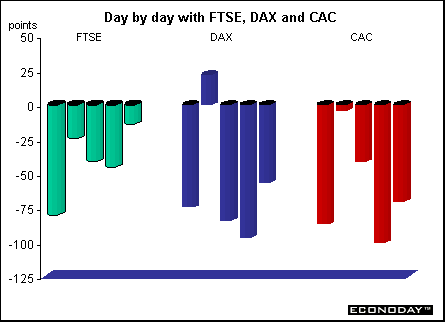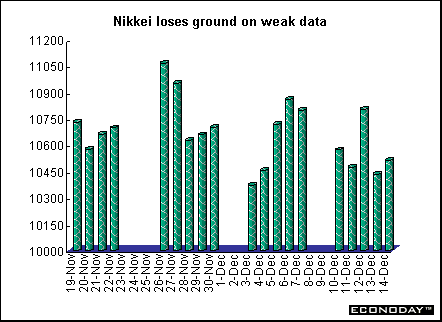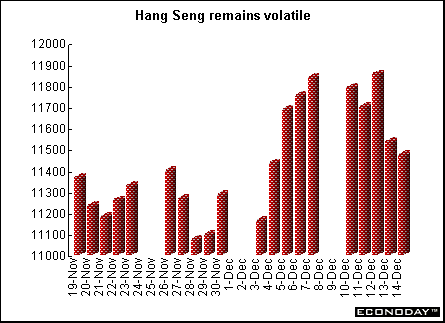 |

Britain and Europe
As could be expected after the gains of the last couple of months, investors took some profits as they look to the looming yearend. Stocks - especially those in technology that had recovered some of their big earlier losses - took the brunt of the sell off. In Britain, the FTSE 100 faltered despite favorable economic news on inflation and retail sales that showed prices under control and the British consumer alive and well - and spending. Less favorable was the news from the industrial sector where manufacturing continues to be in a recession brought about in part by the strong pound sterling against the euro. The exchange rate favors Europe while making British products very expensive. In Europe, continuing weak data from Germany continues to indicate that the country is in a recession while the Netherlands, Italy and France slide precipitously close to one. The equities markets, which had recovered quickly from their September losses, turned downward on the weak economic news as well as profits warnings.

Asia
The Nikkei had a volatile week with investors bouncing with each new indicator. The Nikkei rose vigorously when the Tankan survey diffusion index didn't fall as much as expected, although the number was pretty bad. But the Nikkei later fell hard on news of a boom in bankruptcies. (See Indicator scoreboard for details.) On the week, the Nikkei ended on the down side.

Recently Hong Kong stocks have followed Wall Street higher, but they remain laggards by regional standards. While some foreign funds have moved back to Hong Kong in anticipation of an economic recovery in the middle of next year, most say it is still too early in the equities cycle to be buying the territory's mix of banking, property and telecommunications stocks. Instead, they are opting for Asia's higher growth and technology heavy markets, such as South Korea and Taiwan, where the shares of leading computer chipmakers have soared on hopes that the downturn in U.S. demand for technology goods has bottomed.

The Hong Kong Hang Seng Index ended the week down 366 points, or 3.1 percent. This is up about 29 percent from the market's recent low on September 21, but still down about 24 percent on the year. South Korea's Kospi by contrast is up 32 per cent on the year while Taiwan is 16 percent higher. Hong Kong has been hard hit by the global economic slowdown and contracted 0.3 percent in the third quarter compared to a year earlier and is now forecasting zero GDP growth for the full year compared with 10.5 percent growth last year. Doing little to help have been the string of U.S. interest rate cuts, which feed straight through to Hong Kong's banking system as its currency is pegged against the U.S. dollar. Demand for property, once a mainstay of the economy, remains sluggish while bank lending is flat. Much of the territory's income comes from exports to the U.S. and Europe of lower-end consumer electronics and garments manufactured by Hong Kong based companies in neighboring China.
 |


Introduction • Global Stock Market Indexes • Recap of Global Markets • Currencies • Indicator Scoreboard

The Bottom Line • Looking Ahead
|
 |